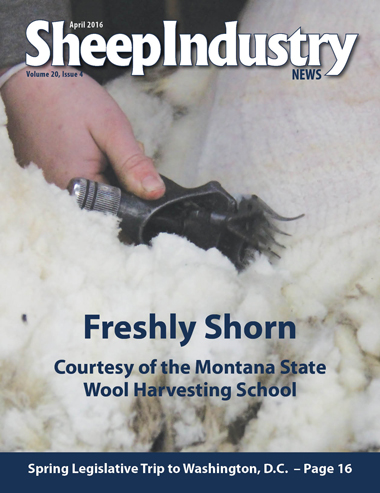Burton Pfliger, ASI President
More than 50 sheep producers have just returned from the annual pilgrimage to Washington, D.C. To those who took the time and made the effort, I extend a most gracious thank you. It truly is a lesson in government, democracy and leadership.
While in D.C., our groups met with Dr. Craig Morris of the U.S. Department of Agriculture’s Agricultural Marketing Service, who, at this time, has published the new Mandatory Price Reporting rule. For those who have been following the Livestock Risk Protection – Lamb insurance program recently, you have noticed no policy sales have been offered since our convention. Burdell Johnson has been very forthright in his emails highlighting the absence of the LM 352 report as the cause for no sales.
The reason cited by USDA is confidentiality. USDA views confidentiality as an over-arching principle of market news reporting. Today we have the 3/70/20 rule, which prevents report publication when less than three reporting parties participate. ASI has been working for more than two years on the proposed new rules that would redefine committed lambs, lower threshold numbers for slaughter facilities, consolidate import categories to add three importers and shift pelt reporting to pelt credit between producer and packer – all in an effort to make more reported trades eligible in the market news program.
In March of 2015, I testified in front of the House Agriculture Committee along with beef, swine and the North American Meat Institute. When questioned by the committee chairman, all agreed the proposed changes were non-controversial and all supported the changes. In February 2016, USDA provided the key topics they planned to publish for comment on lamb and pork so there were no surprises in the Federal Register notices in March. Sheep leaders clearly stated the need for USDA to address the LM 352 report.
The current market conditions are somewhat worrisome. Slaughter lambs have declined 20-25 dollars since the absence of MPR. Current freezer inventories have doubled the record set last year and now stand at 47 million pounds. Adding to that, we have a new lamb crop either on the ground or about to be on the ground. This should concern everyone and underscore the importance and need for mandatory price reporting.
We also met with Dr. Steve Kappes with USDA’s Agriculture Research Service. He chose to highlight some of the research conducted at different stations around the country.
When questioned about the future of the United States Sheep Experiment Station in Dubois, Idaho, his response was that “ARS was neutral.” I noted to him his opening remarks stated ARS was responsive to its stakeholders. I asked Kappes how ARS could be neutral on USSES when 50-plus supporters had traveled to Washington to express concern and support about USSES. To which, I received no reply.
We did receive a positive report from Bill Clay, administrator of Wildlife Services. Clay expressed gratitude for the annual effort lead by ASI to support the service’s funding. This year, a record 204 organizations joined forces to support the program.
Paul Spencer with the Foreign Ag Service reported on the progress of key export markets sought by the sheep industry since 2003. Progress is being made on the Japan market. A Taiwan announcement is expected soon, of which ASI has hopes of shared success. Spencer shared some interesting statistics about the TPP treaty. Those countries enrolled in TPP account for 40 percent of the world gross domestic product, while 42 percent of U.S. agriculture GDP will be affected by TPP. Much of this country’s news is centered on TPP but China is working on a larger trade agreement with 16 countries. He added that by the year 2030, Asia proper will contain 66 percent of the world’s middle class.
Dr. Alan Huddelston reported on the scrapie eradication program. While much good news can be reported on the incidence of disease, many expressed frustration about the moving deadline for declaration-free status for the United States. Those attending the convention might remember USDA Under Secretary Edward Avalos pledging to publish the final scrapie rule before he leaves office in January 2017. This would be positive for our industry.
While on the hill with my elected leaders, I advocated for full funding of wildlife services, the addition of like allotments for producers displaced by bighorn sheep, supporting full funding for USSES, continued funding of the scrapie eradication program and asked my senator (Heidi Heitkamp) to put the Department of Labor on record for the delay of H-2A visa processing and the multiple interpretations of the same rule. She agreed completely.
Making the trip to visit with elected leaders brings a level of sincerity, credibility and real world applications to senators and representatives. These producers provide perspective on how promulgated laws and rules impact the two percent of Americans who feed the world. Each time I make the trip I build upon the relationship and rapport already established. I encourage each of you to do the same with your own delegation.



